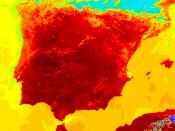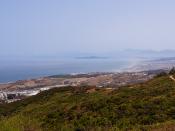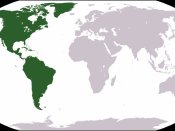The Renaissance, the revival of classical art, literature, and learning which took place in Europe in 15th and 16th centuries, sparked imaginations and made people eager to explore. The promise of new riches, such as the spices as silks of the Far East, and the potential discovery of the fabled Northwest Passage were the primary objectives, which fueled the exploration of the New World. The age of exploration was filled with courageous voyagers and conquistadors from all over Europe, much like today. There was much competition for land rights. The main land disputes were between Spain and Portugal.
The Spanish monarchy was stronger than ever before and in a position to support foreign ventures; it could bear the costs and dangers of exploration. But, "Portugal situated on the extreme southwestern edge of the European continent, got the start on the rest of Europe." (p. 478) They sought greatness in the unknown world oversees.
In the early phases of Portuguese exploration, Prince Henry "the Navigator" (1394-1460) played the leading role. In the fifteenth century, most of the gold that reached Europe came from Sudan by way of Portugal. Portuguese ships transported gold to Lisbon, and by 1500 Portugal controlled the flow of gold to Europe. This had commenced the golden century of Portuguese prosperity.
Christopher Columbus a sea captain from Genoa, Italy, considered one of the greatest explorers of all time. Like every other explorer, Columbus had many reasons for his exploration. However, it is made obvious by studies of the history of Columbus' explorations that his main motive for exploration was greed. Columbus had the same desires as many explorers both before and after him. He yearned for gold. He wanted land. He wanted power.
The whole purpose for his first voyage to what he thought was India, but...


